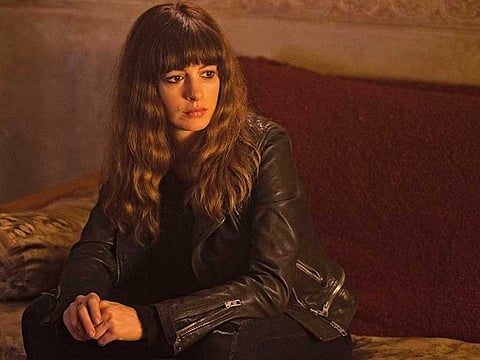‘Colossal’ film review: Anne Hathaway towers
Hathaway fully embraces her character, Gloria, in all her wild, unrepentant messiness

You could say that Colossal offers a welcome reminder of what a good actress Anne Hathaway can be, except that some of us never forgot in the first place.
Still, it bears pointing out that this goofily, fitfully inspired genre experiment, written and directed by the Spanish filmmaker Nacho Vigalondo, gives the actress her liveliest role in years — possibly her best since Rachel Getting Married, a very different movie that also allowed her to get wasted, behave badly and throw both caution and likeability to the wind.
Neither Hathaway nor the script makes any overt bids for the audience’s sympathy in Colossal, which may explain why they earn it so handily. She plays Gloria, a down-on-her-luck drunk whose life has become a series of underachievement’s and disappointments, until she stumbles on an unexpected road to recovery — one that leads across a kids’ playground and right into the crowded streets of Seoul, where a giant green monster and its robot nemesis threaten to wreak havoc on the local populace.
It’s a set-up that might pack a greater metaphorical punch now, amid the political chaos and scandal that have recently engulfed South Korea, than it did several months ago when Colossal premiered at the Toronto International Film Festival. But then, real-world implications are not especially high on Vigalondo’s list of priorities here. He has fashioned a sly, winking homage to Godzilla and other kaiju in the Asian monster-movie canon, and hitched it, in ways both ridiculous and intuitive, to a story about a major American screw-up trying to get her life back on track.
Gloria was recently dumped by her New York boyfriend, Tim (Dan Stevens), who is beyond fed up with her non-stop drinking, irresponsible behaviour and inability to hold down a job since she lost her magazine writing gig a year earlier. (“At least your haters on the internet will leave you alone!” he snaps, in a line that must have amused Hathaway no end.)
Like a nicer, more scattered version of the self-destructive misanthrope played by Charlize Theron in Young Adult, Gloria returns to the sleepy, nondescript suburb where she grew up. She tries her best to curb her alcoholic, narcoleptic tendencies, although it doesn’t help when she runs into an old friend, Oscar (Jason Sudeikis), and takes a part-time job at his bar.
Her nightly hangouts with Oscar and his drinking buddies, Joel (Austin Stowell) and Garth (Tim Blake Nelson), carry an undercurrent of jealousy and menace that, in a more straightforward movie, might have played out with a few hurt feelings and broken bottles. But Colossal has something more playful and audacious up its sleeve, which it unleashes once Gloria stops by that neighbourhood playground and realises, to her shock and amazement, that even her simplest actions have incredibly far-reaching consequences.
Exactly how Gloria’s actions might affect the lives of people half a world away is something best left for the viewer to discover. Suffice to say that Vigalondo, whose previous films include the low-budget time-travel thriller Timecrimes (2007) and the insanely convoluted computer-desktop thriller Open Windows (2014), has once again struck upon an ingeniously out-there premise that sometimes struggles to justify its feature-length treatment.
Colossal has a killer set-up but stumbles more than once en route to its rousing finish, particularly when it tries to back up its premise with an origin story that urges us to think more about minor details than we should. But while a second, tighter pass at the script wouldn’t have gone awry, the movie works well enough as a sly riff on classic kaiju cinema (and a superior version of Power Rangers to boot). It’s also a surprisingly convincing satire of mass panic and media overreaction in the viral era.
A few buildings get crushed and several bloodless casualties are reported, but the visual effects in this modestly budgeted production are designed less to impress us with their digital shock-and-awe than to deepen the movie’s verisimilitude. There is something pleasingly subversive, too, about the way Colossal takes an industrial filmmaking genre typically defined by Michael Bay’s mindless, male-targeted orgies of mass destruction, and turns it into a vehicle for something approaching a feminist critique.
While Gloria’s newfound powers provide her with an immediate reason to stay sore, they trigger the opposite impulse in Oscar, who turns out to be both a self-pitying loser and an intractable bully — someone permanently embittered by his inability to look beyond his own disappointing, directionless existence. Sudeikis all but erases the difference between malice and self-pity, making Oscar a uniquely loathsome study in toxic masculinity, and not the movie’s only one. Tim, played with supercilious wit by Stevens, is in his own way no less sadistic and self-serving.
Standing between them is Gloria, whom Hathaway fully embraces in all her wild, unrepentant messiness. By the end, the character’s heroic stature is both improbable and undeniable, and it stems less from what she’s done than from what she’s finally stopped letting others do. Recovery may still be in the cards, but Gloria hasn’t found redemption, exactly — mainly, the movie suggests, because she never needed it in the first place.
Don’t miss it
Colossal releases in the UAE on May 18.


